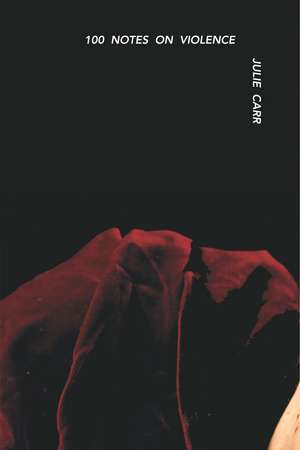100 Notes on Violence
Autor Julie Carren Limba Engleză Paperback – 27 mar 2024
Julie Carr obsessively researches instances of intimate terrorism, looking everywhere from Walt Whitman and Emily Dickinson to lists of phobias and weapon-store catalogs. She searches for what can be learned from the statistics, the statements by and about rapists and killers, the websites of hate groups, and the capacity for cruelty that lies within all of us. 100 Notes on Violence is a diary, a document, and a dream log of the violence that grips America and devastates so many. But Carr also offers a layered and lyric tribute to violence’s counterforces: love, commonality, and care. Her unflinching “notes” provoke our minds and burrow into our emotions, leading us to confront our fears and our own complicity.
Preț: 105.96 lei
Nou
Puncte Express: 159
Preț estimativ în valută:
20.28€ • 21.09$ • 16.100£
20.28€ • 21.09$ • 16.100£
Carte disponibilă
Livrare economică 21 februarie-07 martie
Preluare comenzi: 021 569.72.76
Specificații
ISBN-13: 9781632431097
ISBN-10: 1632431092
Pagini: 124
Dimensiuni: 184 x 241 x 13 mm
Greutate: 0.25 kg
Editura: Omnidawn Publishing, Inc.
ISBN-10: 1632431092
Pagini: 124
Dimensiuni: 184 x 241 x 13 mm
Greutate: 0.25 kg
Editura: Omnidawn Publishing, Inc.
Notă biografică
Julie Carr is the author of ten books of poetry and prose, including Objects from a Borrowed Confession, Someone Shot my Book, and Real Life: An Installation, the latter also published by Omnidawn. With Jeffrey Robinson, she is the coeditor of Active Romanticism. She is the cofounder of Counterpath Press, Counterpath Gallery, and Counterpath Community Garden in Denver. Carr is professor at the University of Colorado Boulder in the Department of English and the Intermedia Art, Writing and Performance program.
Recenzii
"A sprawling experimental poem in 100 parts, Carr's third collection variously examines the ways violence permeates our daily lives. Part personal reflection, part research project, Carr echoes writers and thinkers from Dickinson and Whitman to Bataille and Sontag."
“When Carr’s poems sit in their own terrified piss, it isn’t for comfort, as Corman’s child does, but because they want to articulate the world through experience of violence. They want to, and—childlike—they can’t. Their stuttering and their silences say the unsayable”
"So what about words? Carr has built a ‘cupboard’ of them. They seem least able to overcome or escape their subject when they are most moored to common usage and what we call ‘sense.’ They are best able to make a way to an un-obliterating hour or world, when they’ve been marred, or played prestissimo, or translated back into barbarous sound."
